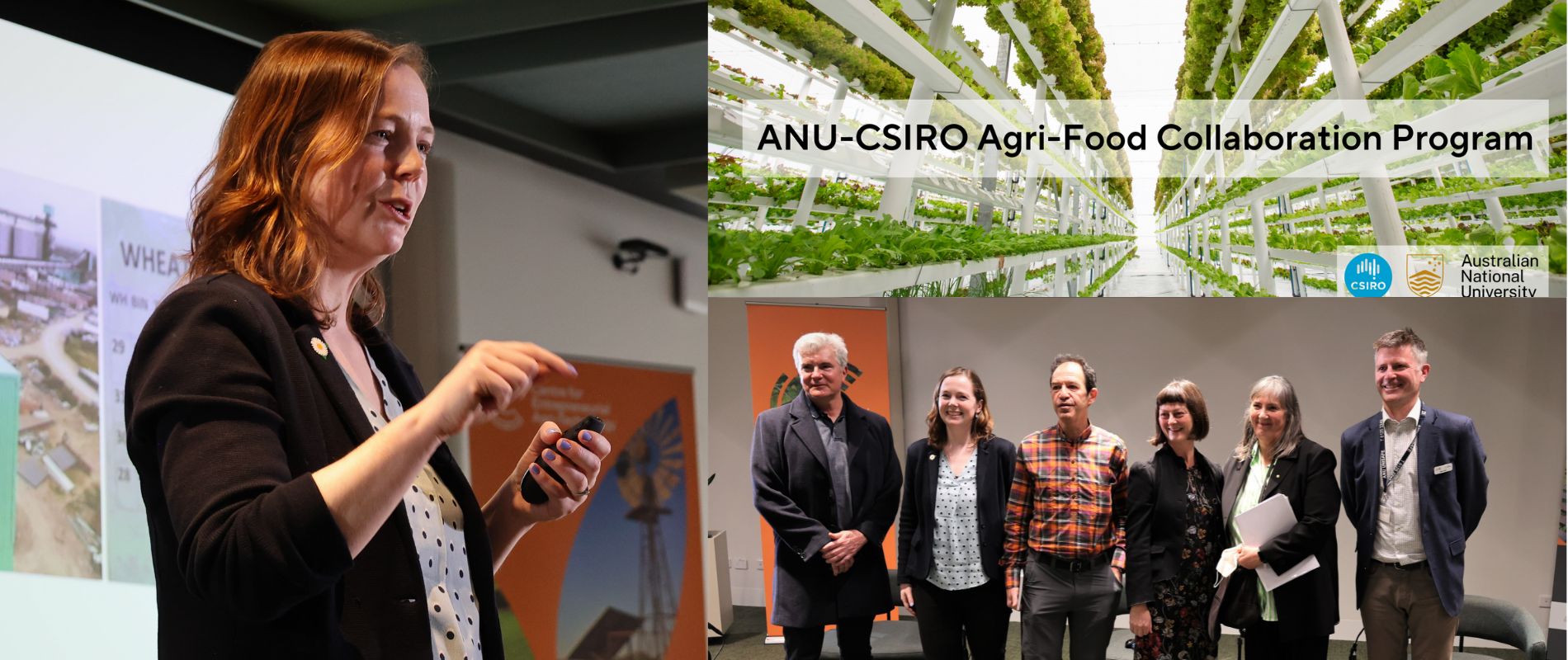During August, I was proud to host one of CEAT’s Fellows, Dr Alison Bentley, during her stay in Canberra. In her role as Director of the Global Wheat Program at the International Maize and Wheat Improvement Center (CIMMYT), Alison spoke at the Crawford Fund Conference at Australian Parliament House. Alison then spent a week at ANU, meeting CEAT staff, ANU and CSIRO researchers, and representatives of several government agencies. She also gave a public lecture titled ‘Shock-proof staples: building system resilience for cereal crops’, which was followed by a panel discussion on challenges facing the global food system.
The panel discussion was facilitated by award-winning journalist Alex Sloan AM, with inputs from Professor Sharon Friel, Professor Mark Howden and Dr Eric Huttner. In her speech, Alison highlighted the importance of wheat in stabilising food prices across the globe, and how interruptions to supply (e.g. due to droughts, heat waves, lack of fertilisers, and war) have led to incidents of social unrest in countries that rely on imported grain. She also discussed challenges emerging from the Russian invasion of Ukraine; these challenges have been felt most severely in African countries which import 60 per cent of their grain from these two countries.
Alison also proposed ways to address global food security challenges; these included existing producers increasing their production, improving access to climate-ready seed, securing supply lines, and helping developing countries to become self-sufficient in production. Alison highlighted the importance of R&D investment for boosting production, both in the short and long-term. She finished her speech by suggesting ANU could contribute to global efforts to improve food security through:
- being at the cutting-edge of innovation and ensuring outputs are publicly available
- developing new ways of thinking/creative ways of addressing food security challenges
- training the next generation of minds to ensure they are equipped with the skills needed.
The subsequent panel discussion explored a range of issues, with socio-economic-political-environmental considerations featuring prominently. Panellists also discussed the contested nature of the food system and associated inequities, as well as the need to consider desired food system outcomes when negotiating international trade agreements.
For me, one of the major take-home messages of the event was the need for a systems approach when addressing food security issues. While investment in technology will be important, alone it will not be enough, with investment also needed into the societal, economic and trade elements restricting food supply to much of the developing world. Knowing that ANU has strengths in many relevant areas, there is an opportunity for the University to contribute in ways that target improvements in food security around the globe.
Alison was also the instigator of a CEAT-led workshop in August that explored what crop breeding can learn from the COVID-19 pandemic expedited timeframe for vaccine development and roll-out. Like vaccines, improved crop varieties generally take more than 10 years to reach end-users through a combination of scientific discovery and innovation, development, testing and regulatory approval. Given that the vaccine industry was able to produce COVID-19 vaccines for use in less than a year, we wanted to learn from the experience to help identify ways to accelerate breeding and distribution of climate-ready cereals. With this in mind, CEAT ran a workshop that explored the COVID-19 experience, with input from Doherty Institute experts (Professors Terry Nolan and Damian Purcell), Moderna (Dr Carolyn Tucek-Szabo), and Sementis (Leanne Hobbs). From the crop side, reflections on what slows production of new varieties were provided by Dr Dan Mullan (Intergrain), Dr Anne-Sophie Dielen (Croplife), and Alison. The learnings from the workshop will be used to help identify possible ways to accelerate the development of new types of crops needed to achieve global food security.
A key ingredient in achieving food security breakthroughs will be breaking down silos that separate institutions, departments and researchers from forming the interdisciplinary collaborations needed to address complex challenges. Mindful of this, over the past few months CEAT has played a leading role in establishing the ANU-CSIRO Agri-Food Collaboration Program (AFCP). Valued at over $1 million, the AFCP supports collaborations between the two organisations in agri-food research by:
- promoting interdisciplinary and co-innovation approaches to solving complex agri-sector challenges
- investing in industry-validated projects that have the potential to result in high impact outcomes within CSIRO’s seven impact areas: (1) secure food systems; (2) healthy foods; (3) trusted supply chains; (4) resilient farming systems; (5) high value protein; (6) future crops; and, (7) improved footprint
- supporting projects which tackle near to long-term challenges, including those that are beyond the current investment timeline of CSIRO’s mission (i.e. >5 years).
Applicants for the award attended a workshop facilitated by Canberra Innovation Network (CBRIN) to develop their project’s value proposition, explore strategies and skills for engaging with industry partners to validate need, and to develop pathways to impact. Several outstanding applications were then considered by an expert panel from ANU and CSIRO, with the successful application being one from Dr Caitlin Byrt (ANU) and Dr Cathryn O’Sullivan (CSIRO) on membrane separation technologies to retrieve fertilisers from wastewater. You can read more about the project here. A feature of the AFCP is the pipeline of other industry-relevant projects that have emerged, each with unique and new collaborations between parts of the ANU and CSIRO that rarely collaborate. I look forward to seeing those projects, along with the one from Caitlin and Cathryn, moving from ideas to real world projects and impact.
Finally, in the coming months, additional space will become available in the CEAT Innovation Hub for businesses who are working in areas relevant to CEAT’s mission. Please keep an eye out for details on the space, and contact us if you are interested in joining the CEAT Hub community.
Best wishes. And make sure you read our CEAT newsletter!
Thank you.
Owen Atkin, Director, CEAT
